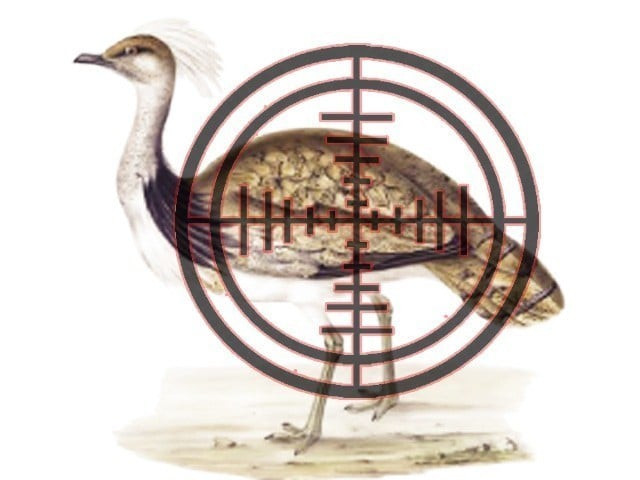Balochistan defends Houbara Bustard hunts by Arab royals
Says hunting should be allowed for limited number of birds under the supervision of forest and wildlife department

Houbara Bustard. PHOTO: CREATIVE COMMONS
Additional Advocate General Balochistan, while submitting the provincial government’s reply in the apex court on alleged illegal hunting permits issued to Gulf royals, argued that since the Houbara Bustard was a migratory bird, its hunting may be allowed in limited numbers under strict supervision of the provincial forest and wildlife department. It added that petition was devoid of merit and should thus be dismissed.
The Supreme Court is hearing a petition against illegal hunting permits issued to royal visitors from Gulf countries to hunt the rare bird despite a ban.
The petitioner requested the bench to cancel all licences issued for hunting Houbara Bustards, further urging the court to restrain the Foreign Office from issuing such permits to foreigners with strict action against officials who issued the licenses.
Read: K-P govt refuses hunting permits to royalty
The court had sought comprehensive reports from all provincial governments regarding 'illegal' issuance of hunting permits to foreign visitors.
The Pakistan Tehreek-e-Insaf-led Khyber-Pakhtunkhwa government had already submitted its reply in the apex court stating that it had refused a request from the Foreign Office to issue permits to royals.
However, on Tuesday, only the Balochistan government submitted a reply.
The reply added that the provincial government had issued the licenses in view of Economic Coordination Committee (ECC)’s May 2014 decision, which allowed the provincial government to issue permits for hunting 100 birds from November 15 to February 15 with a fee of Rs10 million.
It rejected the petitioner’s claim that 2,200 birds were killed in the season, exceeding the set limit by 2,100 birds.
Read: SC questions hunting permits to royalty
The federal government is signatory of treaties and conventions at international forums and the same complied with the provincial governments, the reply added.
The Balochistan government further argued that according to the Section 10 of the Balochistan Wildlife (protection, preservation, conversation and management) Act 2014, a protected animal meant wild animals included in schedule III of the act. However in part –D of schedule -I in the same Act, a provision exists for hunting of particular species, including the Houbara Bustard.
It was also stated that forest and wildlife department ensured the protection of Houbara Bustards and other birds through vigilance, strict enforcement of law and imposition of heavy penalties including imprisonment for violators.
Additional Attorney General Chaudhry Aamir Rehman had requested the bench to club together all related petitions, noting that the federal government had not issued any hunting permit after verdicts of Balochistan High Court and Sindh High Courts.
Read: Where there is Houbara Bustard, there is money
The bench had clubbed all the petitions including a plea of an individual against BHC’s November 2014 order, wherein the hunting of Houbara Bustrad was declared illegal.
Meanwhile, another petitioner contended before the Supreme Court that hunting by Arab royals was favourable for the people of the area as dignitaries coming for the purpose not only established 'certain beneficial projects' but also paid millions in hunting fees.
It argued that the because of the Balochistan High Court’s verdict, the government was facing a loss.
The hearing of case was adjourned until Wednesday.
Areas allocated for hunting
According to a Foreign Office circular, areas were being allocated in four provinces for eleven dignitaries from Qatar.
They would have hunted in Khushab, Jhang, Bhakkar, Bahawalnagar and Layyah in Punjab; Jacobabad, in Sindh; Turbat, Loralai Muskhel, Mushkel Kalat and Jhal Magsi in Balochistan.



















COMMENTS
Comments are moderated and generally will be posted if they are on-topic and not abusive.
For more information, please see our Comments FAQ